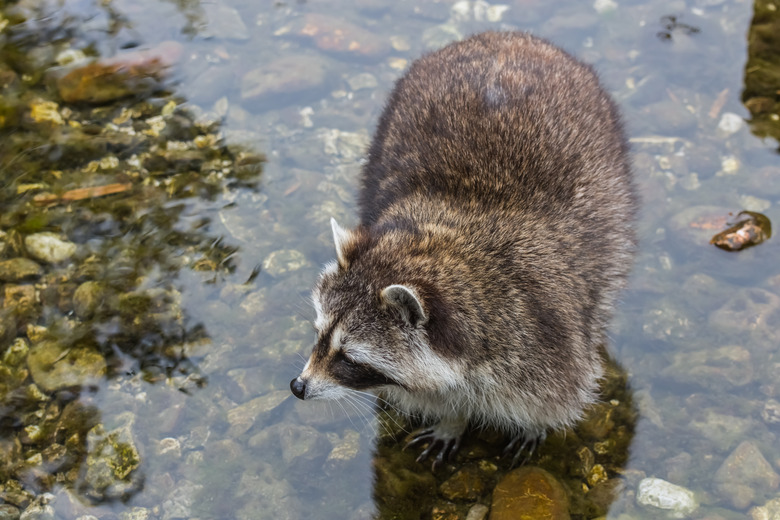What To Do When Raccoons Drop Feces In Your Pool
We may receive a commission on purchases made from links.
Your pool is for your enjoyment as well as for family and friends; however, uninvited furry guests may also believe your pool is for their benefit. While other mammal species, such as squirrels and chipmunks, are not keen on swimming, raccoons love the water and may use your pool for an afternoon dip. Since raccoons defecate in the same areas where they eat and sleep, your pool can become contaminated. Use cultural control methods as well as humane traps to discourage raccoons from using your pool as their personal toilet.
Description of Raccoons
Description of Raccoons
Raccoons are perhaps most recognizable for the black "masks" over their eyes, as well as their bushy, black-ringed tails. These otherwise light-gray or light-brown mammals are found in a variety of environments, including marshes, forests, cities, and prairies, due to their willingness to consume just about anything.
Raccoons grow anywhere between 24 and 38 inches in length and can weigh 4 to 23 lbs. They make their nests in tree holes, fallen logs, and even house attics. Raccoons are prone to attacking trash cans, as they feed on fruit and plants, along with insects, mice, crayfish, and other aquatic creatures.
Raccoons and Swimming Pools
Raccoons and Swimming Pools
Raccoons are attracted to swimming pools, as they love water and often reside close to lakes and streams. In addition to swimming, part of these mammals' attraction to water is their habit of "washing" their front paws and food before consumption or dunking their food in a body of water. As with cats, raccoons prefer to hide their excrement and therefore will use your swimming pool as a toilet. Feces are often found around shallow pool steps.
Health Risks Posed by Raccoons
Health Risks Posed by Raccoons
Health risks pertaining to raccoon excrement in your pool include the eggs of the worm Baylisascaris procyonis, which are often found in raccoon feces. This roundworm parasite is commonly found in raccoons and can pose a danger to humans if large quantities of eggs are swallowed. This occurs from swimming in a contaminated pool, though such infections are rarely diagnosed.
Swallowing a few eggs generally does not result in any symptoms; however, if large quantities are swallowed, they can cause severe neurological illness. Chlorine does not kill these eggs, though it does kill other germs a raccoon may be harboring.
Cleaning and Control
Cleaning and Control
Pools infected with raccoon excrement require backwashing of the filter, as well as draining and hosing the pool. If possible, replace the filter material, and wear disposable gloves while doing so. Double-bag the discarded material, along with the disposable gloves, and wash your hands thoroughly with soap and water following the cleaning. Keep your pool covered whenever possible to keep raccoons out, and keep all fence doors to your pool shut. Avoid keeping trash cans near your pool area, and make sure all cans on your property are tightly sealed.
If it's legal in your state and municipality, set raccoon traps around your pool area to catch the mammals for relocation at least 10 miles from your home. Discuss relocation options with the animal issues department of your local government to avoid breaking any laws concerning wildlife in your area. Call your local animal control to remove the animal if possible.
